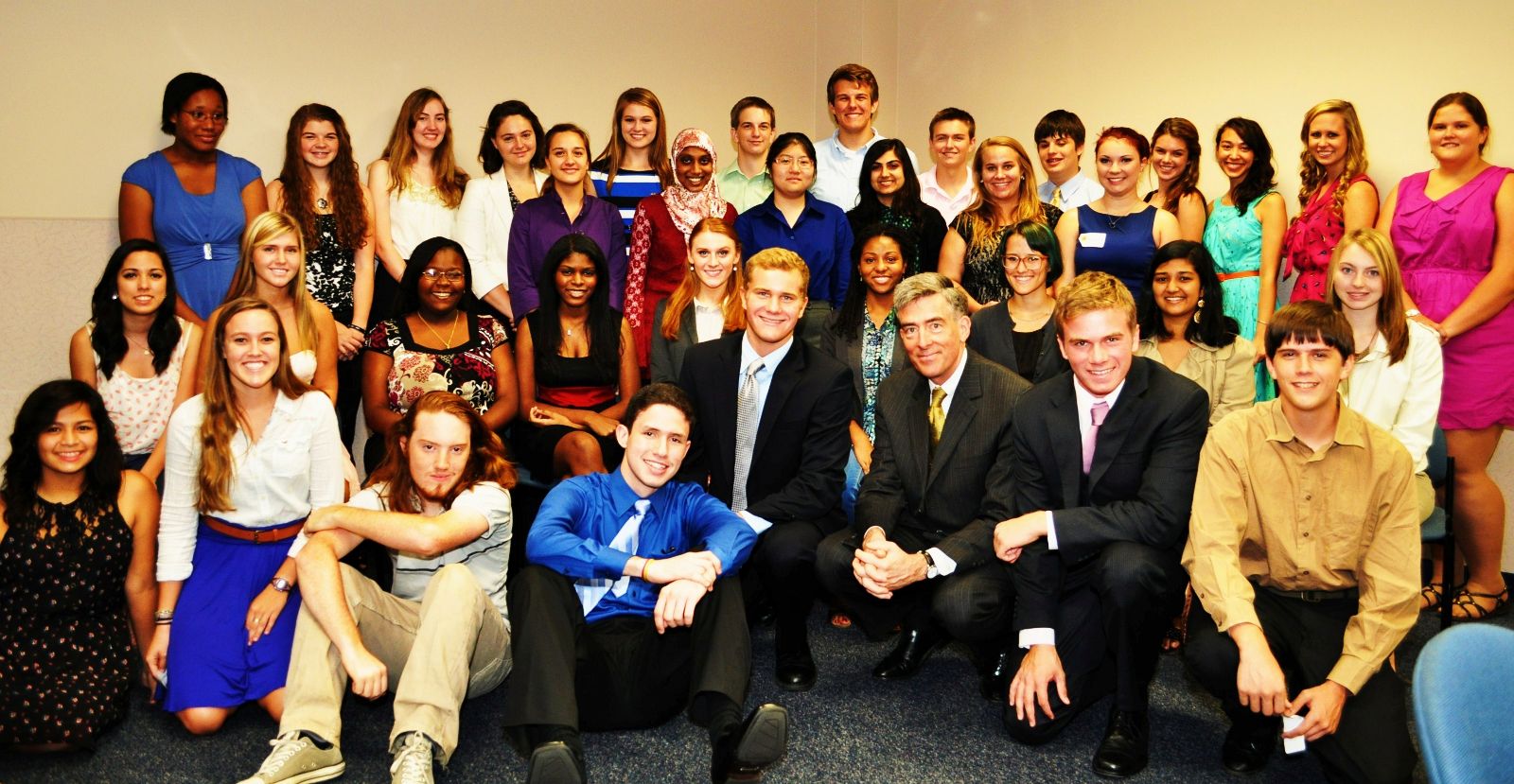Great Decisions Group Profile: World Affairs Council Jacksonville
Photo: Students with then National Security Agency Deputy Director John "Chris" Inglis.
Every two weeks we'll profile a different Great Decisions group from around the country. This week we spoke to Uli Decker, the Director of Education and Community Outreach at the World Affairs Council of Jacksonville in Florida.
Location: Schools in Duval, St. John's and Nassau county in Northeast Florida
Number of participanting schools: 13 (full list)
How long have you been using Great Decisions?
Since 2004. We started with three schools.
What is the structure of the groups? How does their structure make them unique?
The population served in this program is a diverse group of high school students, between the ages of 15–18, at public, private and magnet high schools in Northeast Florida: students who participate in Career Academies and primarily take dual enrollment and advanced placement classes as well as at-risk students at schools in economically-challenged areas that are struggling to meet state requirements.
For the Jacksonville Great Decisions program, a local high school teacher is paired with a college/university liaison and together they facilitate the monthly Great Decisions meetings. While each school’s Great Decisions program structure varies a little, depending on the individual school’s needs and interests (ranging from five to 40 students in attendance; some are Great Decisions groups are “clubs” with student presidents, others are extra credit offerings by Career Academies), all encourage students to drive the conversation, ask questions and share opinions.
The Jacksonville Council offers special events to GD participants, such as the annual International Crisis Management Exercise and Student Interactions with guest speakers (authors, business leaders and government representatives). These additional offerings provide students with an opportunity to apply the knowledge, critical-thinking and decision-making skills honed over the past year in the Great Decisions program.
Can you tell us more about your International Crisis Management Exercise?
The exercise simulates the U.S. government’s handling of an international crisis. With Ambassador Nancy Soderberg and Admiral Jonathan T. Howe, USN (Ret.) acting as presidents, students must work together to come up with advice and recommendations. From high schools participating in the Council’s Great Decisions program, small groups of students are selected to assume the roles of members of the National Security Council and represent different agencies or interests in the U.S. government. Each participating student is given a job title (e.g., Secretary of State, Secretary of Defense, etc.) and students are expected to prepare by reading the crisis scenario and researching their assigned roles.
How has Great Decisions shaped, if it has, the views of participating students and teachers on critical U.S. foreign policy issues?
Here is direct feedback from teachers and former student participants in the program:
“Many students have been influenced by the Great Decisions program over the last 10 years. Several are in the international business/public policy pipeline to top jobs. Good Program.” – Frank Bunton, Stanton College Preparatory School
“Great Decisions has opened up a whole world for our students. Our students can now hold “adult” conversations with their parents and others that they previously could not. This program has introduced students to topics and speakers that they would not be aware of otherwise.” – Rebecca Cofield, Hilliard Middle-Senior High School
“In high school, I participated in a program through the World Affairs Council in Jacksonville, Fla., and the Foreign Policy Association called Great Decisions, and through that program, I was able to discuss controversial issues and participate in a simulation at the University of North Florida, where I acted as the White House Press Secretary. That experience kind of intrigued me.” - Ashley Simmons, 2013 Thomas R. Pickering Foreign Affairs Fellow, commenting on what sparked her interest in international affairs
How has Great Decisions benefited schools in the area?
Both colleges/universities and high schools participating in the Great Decisions program are showcased at council events throughout the year, in council collateral and on the council website, providing visibility and recognition in the greater Jacksonville community. Schools are also able to strengthen their ties to the local colleges/universities and expand partnerships beyond the Great Decisions program.
Can you give us a brief biography?
I’m the Director of Education and Community Outreach at the World Affairs Council of Jacksonville. My main responsibilities include managing the Council’s education programs and grant writing efforts as well as community outreach initiatives and partnerships with other area organizations.
I’m a native of Cologne, Germany, and received my graduate degree in European Studies from Uppsala University in Sweden.
Why do you think Great Decisions is such an important program for your community?
Great Decisions is essential for students who need to be challenged beyond the level of standardized testing. The program allows them to think critically and express their opinions on today's pressing international stories. The Florida State Board of Education’s vision is “to have an efficient world-class education system that engages and prepares all students to be globally competitive for college and careers.”
Connecting various community stakeholders (high schools, colleges/universities and council supporters), the World Affairs Council of Jacksonville is able to contribute to this effort through a vivid Great Decisions enrichment program, bringing the world a little closer to high school students across the First Coast.






